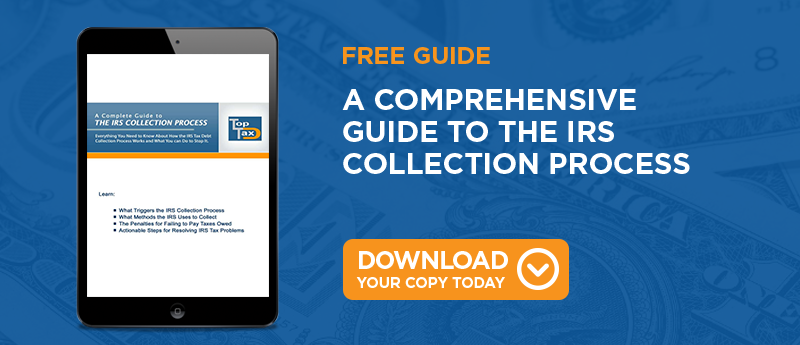.jpg?width=1000&name=The%20IRS%20Collection%20Appeals%20Program%20(CAP).jpg)
Dealing with an IRS collection action such as a levy, a lien, or an IRS property seizure can be stressful and time-consuming. The process for appealing one of these actions can also be a lengthy ordeal. Because your property and assets may be at stake, it is important for you to understand your rights and responsibilities in these situations. You do have the right to appeal most IRS collection actions, but you must do so by following a very specific time frame in order to have your appeal heard.
What is the IRS Collection Appeals Program (CAP)?
The IRS Collection Appeals Program (CAP) is one of two appeals options for taxpayers. The IRS also provides the Collections Due Process (CDP) for appealing collection actions. However, the CAP program is available for more situations than the CDP program, even though a final resolution may take longer. The following are eligible for review under the CDP:
- A notice of federal tax lien
- A notice of intent to levy
- A notice of the agency's intent to seize your property
- A written notice that your IRS installment agreement will be rejected, modified, or terminated
- A notice of intent to levy that you believe to be erroneous
How to Request a Collection Appeals Hearing
The way to request an appeals hearing in these cases varies, depending on the specific collection you are appealing:
- To appeal a notice of intent to levy or impose a lien: Call the applicable IRS telephone number and inform the employee that you want to request a hearing. This is appropriate when your only contact with the agency has been via telephone.
- To appeal a notice of lien, levy, or property seizure: Complete Form 9423 "Collection Appeals Request" and submit it to the collection office overseeing your case. You can do this by mail or in person.
- To appeal the agency's refusal to release property you believe was erroneously seized: Call the IRS phone number on the written notice of refusal and request a conference with the Advisory Group Manager. If you speak with the Advisory Group Manager and are unable to resolve the matter, you can complete Form 9423 and submit it to the Advisory Group office that issued the denial.
- To appeal the modification, rejection, or termination of your installment agreement: Call the IRS phone number on the written notice and attempt to resolve the matter over the phone. If you are unable to do so, you can complete Form 9423 and send it to the Revenue Officer in charge of your case. It's important to note that if the original notice was sent from the Revenue Officer, you must submit your initial appeal in writing.
There are important time limits involved in appealing changes to your installment agreement. If you receive a notice that the IRS intends to reject your proposed agreement, you'll have 30 days to appeal the decision. If you receive a notice that the IRS intends to terminate your agreement, the appeal window is lengthened to 76 days.
If you'd like to appeal an IRS notice involving a proposed lien, levy, property seizure, or adjustment to your installment plan, you can do so by following the Collections Appeals Program (CAP). If you need assistance, a qualified tax attorney can help you decide how to go about handling your appeal.




